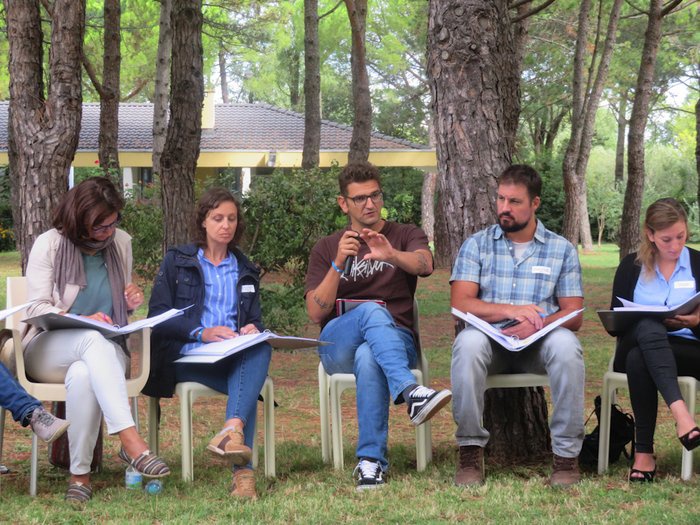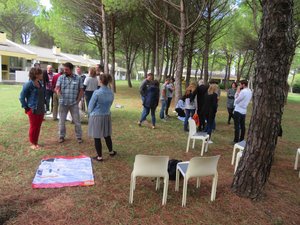
Successful first Summer Shoal
To improve welfare of farmed fish, we need more specific research, more public awareness, more dialogue among all stakeholders and better guidelines: This is the conclusion of an international congress of experts recently held in Italy.
In the first days of September, 34 experts from 12 European countries met at the northernmost coast of the Mediterranean to exchange ethological knowledge and ideas on fish welfare in aquaculture. Avoiding the common conference culture with classroom seating and presentation screen, scientists, animal welfare campaigners and fish farmers met in one big circle under the pines for two days in Marina Julia of Monfalcone in northeastern Italy.
Invited by the fair-fish international association and its FishEthoBase research team, the participants listened to 14 presentations, eased by a full text script book at the disposal of each participant, and engaged in intensive discussion after each lecture.
Scientific based evidence
The first day addressed ethology and fish welfare. fair-fish founder Billo Heinzpeter Studer from Monfalcone explained the idea behind and the practical gain of the fish ethology database FishEthoBase. The four questions of ethology applied to fish welfare were presented by FishEthoBae researcher Dr. João Luis Saraiva from Faro in Portugal while his team colleague Dr. Maria Filipa Castanheira from Vienna highlighted current understanding and future directions of coping styles and welfare in farmed fish.
Dr. Leonor Galhardo from the Higher Institute of Applied Psychology in Lisbon put across the idea that in farming, the challenge goes far beyond reducing stress: It is the animals’ quality of life we have to improve. Behavioural indicators of welfare at the example of octopus were interpreted by Dr. Pablo Arechavala-López from the Mediterranean Institute for Advanced Studies in Mallorca who also contributes to the FishEthoBase as a reviewer.
The question of the fast and increasing domestication of fish species and its role for their welfare was investigated by Dr. Fabrice Teletchea from the Lorraine University in France. And finally, Dr. Mimi E Lam from the University of Bergen in Norway related fish welfare to a broader scientific concept of seafood ethics evaluated along diverse seafood value chains. Two posters completed the section: Dr. Violaine Colson from the French National Institute for Agricultural Research (INRA) presented experiments of a novel emotional and cognitive approach for welfare phenotyping in rainbow trout exposed to hypoxia, whereas Björn Bassmann and Harvey Harbach from the University of Rostock in Germany explained their experiment about the effect of plant abundance on African catfishes’ welfare status in coupled aquaponic systems.
Cooperation with industry and regulators
The second part of Summer Shoal focussed on how to implement fish welfare into practice. It was Andreas Graber, chairman of the biggest Swiss recirculation aquaculture project (RAS) under way, to give an insight in how a commercial RAS fish farmer looks at fish welfare. On the other hand, the founder and director of Friend of the Sea (FOS), a globally leading certification scheme in fishery and aquaculture, Dr. Paolo Bray from Milan, addressed fish welfare as an added value he wants to integrate into the requirements. Eiona Rodgers from the Royal Society for the Prevention of Cruelty to Animals (RSCPA) presented the organisation’s guidelines for the welfare of Atlantic salmon and Rainbow trouts followed by a majority of UK farmers.
A number of campaigning organisations presented their plans to foster fish welfare. For the UK-based Compassion in World Farming (CIWF), Krzysztof Wojtas outlined his NGO’s priorities and opportunities for improving fish welfare. Douglas Waley, from the Brussels based Eurogroup for Animals explained how fish ethology fits into his NGO’s advocacy and communication activities. Phil Brooke from CIWF and Vice-chair of the finfish working group of the European Aquaculture Advisory Council (AAC), related the dialogue with the industry, and so did Paul Denenkamp, Vice-chair of the AAC shellfish working group and board member of the Dutch foundation for the protection of fish (Vissenbescherming).
How can the welfare of farmed fish be improved?
The final plenary discussed the outcome of five working groups. There is enough scientific evidence that fishes are sentient beings and thus deserve the moral benefit of the doubt. However, need of more species-specific research especially on farms is needed in order to indicate ways of improving fish welfare. As public awareness of fish farming and welfare is still low, more information campaigns are crucial to raise willingness for paying an adequate price for higher fish welfare and to back policy makers in trying to improve guidelines and regulations.
